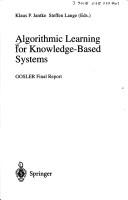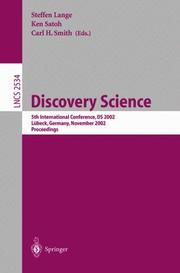| Listing 1 - 9 of 9 |
Sort by
|
Book
ISBN: 9783731612988 Year: 2018 Publisher: Marburg Metropolis-Verlag
Abstract | Keywords | Export | Availability | Bookmark
 Loading...
Loading...Choose an application
- Reference Manager
- EndNote
- RefWorks (Direct export to RefWorks)
How can we organize our economies without growth? "Macroeconomics Without Growth' provides a comprehensive understanding of how non-growing economies can be sustainable. With this book, Steffen Lange brings new momentum into the debate on post-growth, degrowth and steady state economies. The book delves deep into economic theory to understand how a macro-economy can operate without growth. By applying a highly diverse set of theories - from Neoclassical, Keynesian and Marxian traditions - the book is able to cover a wide range of macroeconomic aspects: Is zero growth possible in a capitalist economic system? What happens to aggregate demand and aggregate supply when economies stop growing? And what role do firms, markets and technological change play in post-growth economies? Steffen Lange conclusively shows that sustainable economies without growth are feasible from a macroeconomic perspective. However, small changes will not suffice. Rather, key economic institutions and dynamics need to be rearranged: the prices of labour and natural resources, the structures of companies, the framework of markets - just to name a few. 'Macroeconomics Without Growth' is the first economics book to investigate nongrowing economies in a comprehensive manner. It is a must read both for economists who want to use economics for a sustainable future, and for environmentalists who want to understand the economic principles of sustainable transformations.
Book
ISBN: 398726246X Year: 2023 Publisher: Munich : oekom verlag,
Abstract | Keywords | Export | Availability | Bookmark
 Loading...
Loading...Choose an application
- Reference Manager
- EndNote
- RefWorks (Direct export to RefWorks)
Time seems out of joint. The world society has experienced a centennial pandemic, the global thermometer has displayed a sequence of hottest years on record, and Russia's war on Ukraine has shattered political order. Unsurprisingly, the economy is severely affected. Governments worldwide hope that digital technologies can provide key solutions. Yet this report shows that digitalisation, in its current and mainstream form, is rather aggravating than solving many of the pressing social and environmental crises at hand. What is needed instead is a deep sustainability transformation.
Book
ISBN: 1000061507 1003030882 9781000061505 9781003030881 9781000061567 1000061566 9781000061628 1000061620 9780367467579 0367467577 9780367467616 0367467615 Year: 2020 Publisher: Abingdon, Oxon ; Routledge, Taylor & Francis Group,
Abstract | Keywords | Export | Availability | Bookmark
 Loading...
Loading...Choose an application
- Reference Manager
- EndNote
- RefWorks (Direct export to RefWorks)
In this book, Steffen Lange and Tilman Santarius investigate how digitalization influences environmental and social sustainability. The information revolution is currently changing the daily lives of billions of people worldwide. At the same time, the current economic model and consumerist lifestyle needs to be radically transformed if society is to overcome the challenges humanity is facing on a finite planet. Can the much-discussed disruption potential of digitalization be harnessed for this purpose?Smart Green World? provides guiding principles for a sustainable digital society and develops numerous hands-on proposals for how digitalization can be shaped to become a driving force for social transformation. For instance, the authors explain why more digitalization is needed to realize the transition towards 100% renewable energy and show how this can be achieved without sacrificing privacy. They analyze how the information revolution can transform consumption patterns, mobility habits and industry structures - instead of fostering the consumption of unneeded stuff due to personalized commercials and the acceleration of life. The authors reveal how Artificial Intelligence and the Industrial Internet of Things pose novel environmental challenges and contribute to a polarization of income; but they also demonstrate how the internet can be restored to its status as a commons, with users taking priority and society at large reaping the benefits of technological change in a most democratic way.Providing a comprehensive and practical assessment of both social and environmental opportunities and challenges of digitalization, Smart Green World ? Making Digitalization Work for Sustainability will be of great interest to all those studying the complex interrelationship of the twenty-first-century megatrends of digitalization and decarbonization.
Technology --- Social systems --- Sustainable development. --- Development, Sustainable --- Ecologically sustainable development --- Economic development, Sustainable --- Economic sustainability --- ESD (Ecologically sustainable development) --- Smart growth --- Sustainable development --- Sustainable economic development --- Economic development --- Societal growth --- Progress --- Social evolution --- Social stability --- Social structure --- Social aspects. --- Growth. --- Environmental aspects --- Technological innovations.
Book
ISBN: 3962384448 Year: 2018 Publisher: München oekom verlag
Abstract | Keywords | Export | Availability | Bookmark
 Loading...
Loading...Choose an application
- Reference Manager
- EndNote
- RefWorks (Direct export to RefWorks)
Long description: »Alles wird sich ändern!« Dieser prophetische Ruf aus der IT-Branche ist inzwischen zur gängigen Einschätzung über die Tragweite der Digitalisierung geworden. Doch was bringt die Digitalisierung für Ökologie und Gerechtigkeit? Führt sie uns in eine smarte grüne Welt, in der alle vom technologischen Fortschritt profitieren und wir zugleich schonender mit der Umwelt umgehen? Oder steuern wir in einen digitalen Kapitalismus, in dem sich Geld und Macht auf wenige konzentrieren und die Wirtschaft noch weiter über die planetaren Grenzen hinauswächst? Steffen Lange und Tilman Santarius analysieren, wie sich die Digitalisierung bisher auf Energie- und Ressourcenverbräuche, Arbeitsplätze und Einkommensverteilung ausgewirkt hat, und entwickeln Design-Prinzipien für eine nachhaltige Digitalisierung. Damit die Digitalisierung die Welt auch wirklich smarter macht. Biographical note: Tilman Santarius leitet die Forschungsgruppe »Digitalisierung und sozial-ökologische Transformation« an der TU Berlin und dem Institut für ökologische Wirtschaftsforschung. Er ist Ko-Autor mehrerer Bücher, zuletzt von »Der Rebound-Effekt«. Steffen Lange ist Ökonom am Institut für ökologische Wirtschaftsforschung und Mitglied beim Konzeptwerk Neue Ökonomie sowie bei Common Future. Er beschäftigt sich mit dem Zusammenhang zwischen Digitalisierung, Wachstum und Ökologie.
Nachhaltigkeit --- Digitalisierung --- Governance --- Technologie --- Nachhaltigkeitstheorien

ISBN: 3540602178 3540447377 9783540602170 Year: 1995 Volume: 961 Publisher: Berlin: Springer,
Abstract | Keywords | Export | Availability | Bookmark
 Loading...
Loading...Choose an application
- Reference Manager
- EndNote
- RefWorks (Direct export to RefWorks)
This book is the final report on a comprehensive basic research project, named GOSLER on algorithmic learning for knowledge-based systems supported by the German Federal Ministry of Research and Technology during the years 1991 - 1994. This research effort was focused on the study of fundamental learnability problems integrating theoretical research with the development of tools and experimental investigation. The contributions by 11 participants in the GOSLER project is complemented by contributions from 23 researchers from abroad. Thus the volume provides a competent introduction to algorithmic learning theory.
Algorithmes (Ordinateur) --- Algoritmen (Computer) --- Computer algorithms --- Expert systems (Computer science) --- Expertsystemen (Informatica) --- Systèmes experts (Informatique) --- Computer algorithms. --- Information theory. --- Artificial intelligence. --- Computer science. --- Theory of Computation. --- Artificial Intelligence. --- Mathematical Logic and Formal Languages. --- Informatics --- Science --- AI (Artificial intelligence) --- Artificial thinking --- Electronic brains --- Intellectronics --- Intelligence, Artificial --- Intelligent machines --- Machine intelligence --- Thinking, Artificial --- Bionics --- Cognitive science --- Digital computer simulation --- Electronic data processing --- Logic machines --- Machine theory --- Self-organizing systems --- Simulation methods --- Fifth generation computers --- Neural computers --- Communication theory --- Communication --- Cybernetics
Book
ISBN: 9783826058011 3826058011 Year: 2016 Publisher: Würzburg : Königshausen & Neumann,
Abstract | Keywords | Export | Availability | Bookmark
 Loading...
Loading...Choose an application
- Reference Manager
- EndNote
- RefWorks (Direct export to RefWorks)
Philosophie de la nature --- Philosophy of nature --- Philosophy, German --- Hegel, Georg Wilhelm Friedrich, --- Philosophie allemande --- Congresses. --- Congresses --- Congrès --- Congrès
Book
Year: 1996 Publisher: Herne : Ruhrkohle Bergbau AG,
Abstract | Keywords | Export | Availability | Bookmark
 Loading...
Loading...Choose an application
- Reference Manager
- EndNote
- RefWorks (Direct export to RefWorks)

ISBN: 3540001883 3540361820 Year: 2002 Publisher: Berlin, Heidelberg : Springer Berlin Heidelberg : Imprint: Springer,
Abstract | Keywords | Export | Availability | Bookmark
 Loading...
Loading...Choose an application
- Reference Manager
- EndNote
- RefWorks (Direct export to RefWorks)
Database management. --- Science --- Computer science. --- Information storage and retrieval systems. --- Artificial intelligence. --- Information technology. --- Database Management. --- Philosophy of Science. --- Computer Science, general. --- Information Storage and Retrieval. --- Artificial Intelligence. --- IT in Business. --- Philosophy. --- IT (Information technology) --- Technology --- Telematics --- Information superhighway --- Knowledge management --- AI (Artificial intelligence) --- Artificial thinking --- Electronic brains --- Intellectronics --- Intelligence, Artificial --- Intelligent machines --- Machine intelligence --- Thinking, Artificial --- Bionics --- Cognitive science --- Digital computer simulation --- Electronic data processing --- Logic machines --- Machine theory --- Self-organizing systems --- Simulation methods --- Fifth generation computers --- Neural computers --- Informatics --- Normal science --- Philosophy of science --- Data base management --- Data services (Database management) --- Database management services --- DBMS (Computer science) --- Generalized data management systems --- Services, Database management --- Systems, Database management --- Systems, Generalized database management --- Automatic data storage --- Automatic information retrieval --- Automation in documentation --- Computer-based information systems --- Data processing systems --- Data storage and retrieval systems --- Discovery systems, Information --- Information discovery systems --- Information processing systems --- Information retrieval systems --- Machine data storage and retrieval --- Mechanized information storage and retrieval systems --- Computer systems --- Electronic information resources --- Data libraries --- Digital libraries --- Information organization --- Information retrieval --- Discoveries in science --- Computer science --- Philosophy --- Breakthroughs, Scientific --- Discoveries, Scientific --- Scientific breakthroughs --- Scientific discoveries --- Creative ability in science --- Research --- Philosophy and science. --- Information storage and retrieval. --- Business—Data processing. --- Science and philosophy
Book

ISBN: 9783112733417 Year: 1987 Publisher: Berlin Boston
Abstract | Keywords | Export | Availability | Bookmark
 Loading...
Loading...Choose an application
- Reference Manager
- EndNote
- RefWorks (Direct export to RefWorks)
| Listing 1 - 9 of 9 |
Sort by
|

 Search
Search Feedback
Feedback About UniCat
About UniCat  Help
Help News
News